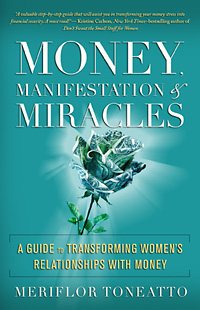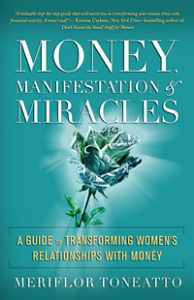
Manifesting Money – and Miracles
 Whether we realize it or not, many of us are stuck in a “money pattern” – and it affects everything we think, see, and do around money.
Whether we realize it or not, many of us are stuck in a “money pattern” – and it affects everything we think, see, and do around money.
Our beliefs about money have been handed down to us through generations, in a variety of different ways, shaping how we view the subject of money.
Think about the news you see on television or hear on the radio or read in the newspaper. How much of it is fear-based? How much of it stems from scarcity – the fear of never having enough or being good enough?
Our relationship with money is not just a series of practical actions. If that’s all it required, everyone would have an easy time with it. The truth is – there’s both an emotional and practical component involved.
When we address the emotional and energetic pieces of our money relationship, the practical actions become very simple and easy – and success is more attainable.
What emotions are you currently attaching to money? And how are they impacting your financial decisions?
To explore these questions, I’ve invited Meriflor Toneatto, author of a new book from New World Library, “Money, Manifestation & Miracles: A Guide to Transforming Women’s Relationships with Money” to join me on my blog today.
As a professional coach, speaker, and entrepreneur – she has helped countless women transform their relationship with money and achieve financial success while fulfilling their social promise in the world.
*********
What inspired you to write Money, Manifestation & Miracles? And why now?
I was inspired to write the book for two reasons. First, I want to change the state of affairs for women, especially in business and leadership. I came across a shocking statistic that while women-owned businesses in the United States generated $1.6 trillion in revenues in 2016 and employed close to 9 million people, only 3.3 percent generated more than $500,000. And less much than 3% generated over $1 million revenues.
Women have made great strides, yet they are still lagging in earnings (wage gap), leadership roles, politics, and business income.
Second, when women are empowered with money, they become “difference makers.” They transform not only their own lives but the lives of others for the better, and they pay it forward with their own successes. On average women reinvest 90 cents of every dollar they earn to family, education, health, and nutrition.
Now is the perfect time to change the current state of affairs. By advancing women’s equity and by narrowing the gender gap in the world of work, we can add $12 trillion to global economic growth by 2025 (McKinsey report 2015).
You write about money being an “emotional currency for women.” Can you expand on this?
For women, money is deeply connected to our emotions. It’s tied to our sense of self-worth and self-confidence, and our feelings of safety and security.
These emotions can have a profound effect in terms of either moving a woman forward or keeping her stuck. I often say that “your emotional state will ultimately determine your financial state.”
The good news is that once women overcome deep seated blocks regarding money, they become unstoppable in achieving financial prosperity and being a “difference maker.”
What can hold women back from greater wealth and success? And what can they do to resolve it?
A key factor that holds women back from greater wealth and success has to do with their self-confidence.
After working with many women from all walks of life, I have witnessed that regardless of age, educational background, and income level, many women privately struggle with valuing themselves and their worth. This, in turn, can impact their ability to succeed or grow their business or advance in their career (women do hesitate to “lean in”).
The root cause of this issue is this – what holds many women back from making the kind of income they desire and deserve has little to do with their intelligence, motivation, or spirit — but much to do with their relationship to money.
The way to resolve this is to turn inward, look within, identify the deep-seated emotional blocks and beliefs about money and actively work on overcoming these blocks. This book provides a step-by-step guide to transforming their relationship with money, so it’s a great resource.
You encourage women to keep a money gratitude journal. Tell us more.
Whatever you focus on grows. If you give attention to worry or fear, you bring it into your experience. Likewise, if you give attention to abundance and joy, you bring that experience into your world. So it’s vital to be aware of what you focus on.
Many people are familiar with having a gratitude journal and counting one’s blessings. A money gratitude journal is the same idea – where you focus on and write about what you are grateful for related to money.
Here’s an example – one day I bought many things at a store, but I didn’t pay for anything because I had a gift card that I forgot about. Then a friend took me out for lunch as a treat for a favor. Then later in the day, I won a free drink at the coffee shop. I was so grateful for this – and just beaming with joy and light energy, then I got home and a check I had been waiting for arrived. I wrote about my great fortune in my gratitude journal and found more things to be grateful for.
What is our financial starting point and why is it important?
With any goal in life, it’s important to know your starting point. And in order to get to where you want to be with your financial goal(s), it’s worthwhile to first assess where you are currently, i.e. what is your financial starting point?
It’s important to know your financial starting point because it’s a great opportunity to assess your doubts and fears about money so you can overcome them.
I often ask my clients to identify their financial starting point by first assessing their current relationship with money – and also taking stock of how prosperous they are right now in all areas of their life through my Holistic Wealth Wheel exercise. I share both of these exercises in the book.
What are some ways that women sabotage themselves when it comes to money?
Some of the ways that women can sabotage themselves regarding money can include – under earning, under charging, over delivering, unclear or “squishy” boundaries, having trouble saying “no” for fear of not being liked or not being nice, or asking for less when negotiating a business contract or salary, feeling anxious and fearful about having money conversations with the bank, clients, family, significant other, partner, etc.
The good news is that I cover all of these specific aspects in the book and provide a step-by-step guide to becoming more empowered with money – and therefore, becoming more empowered in life.
*********
 Meriflor Toneatto is the author of Money, Manifestation & Miracles. As the CEO and founder of Power With Soul, she specializes in helping ambitious women entrepreneurs, professionals and leaders to reach financial prosperity and success while fulfilling their social promise in the world. Her work has been featured internationally in media outlets like Yahoo! Finance, Washington Post, International Business Times, Los Angeles Times, and more. Please visit her online at: http://www.meriflor.co
Meriflor Toneatto is the author of Money, Manifestation & Miracles. As the CEO and founder of Power With Soul, she specializes in helping ambitious women entrepreneurs, professionals and leaders to reach financial prosperity and success while fulfilling their social promise in the world. Her work has been featured internationally in media outlets like Yahoo! Finance, Washington Post, International Business Times, Los Angeles Times, and more. Please visit her online at: http://www.meriflor.co


3 Comments
Bobbi
I was just thinking about the health of my relationship to money this morning, so my reading this is perfect timing. I think the biggest thing for me is “squishy” boundaries. I’ve always been a giver, and have a hard time taking myself into account with boundaries. I’ve also come to learn that this is directly reflected in my relationship to money. Thank you for the validation Tina!
Tracy Thaden
I know I have money “baggage” from my Father, who had a childhood full of lack not only due to living in the Depression, but also from great lack around his family life. Being aware of this has helped me to focus not on lack but on the abundance I have. There is still work to do around this, and it looks like this book can help! Thanks for highlighting this important issue Tina!
Philipa
Wow this is such an important topic for us as woman, yes I can identify my Dad’s stuff.
Having money is vital as a women, we need to earn, keep it and safeguard it.
Thanks Tina and Meriflor.
Great book xx